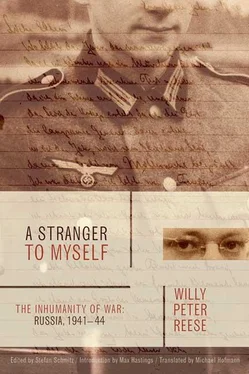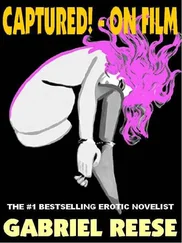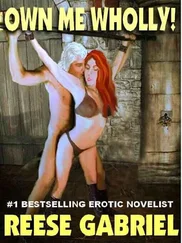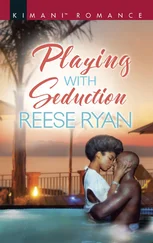Willy Reese - A Stranger to Myself
Здесь есть возможность читать онлайн «Willy Reese - A Stranger to Myself» весь текст электронной книги совершенно бесплатно (целиком полную версию без сокращений). В некоторых случаях можно слушать аудио, скачать через торрент в формате fb2 и присутствует краткое содержание. Город: New York, Год выпуска: 2011, ISBN: 2011, Издательство: Farrar, Straus and Giroux, Жанр: Биографии и Мемуары, military_history, на английском языке. Описание произведения, (предисловие) а так же отзывы посетителей доступны на портале библиотеки ЛибКат.
- Название:A Stranger to Myself
- Автор:
- Издательство:Farrar, Straus and Giroux
- Жанр:
- Год:2011
- Город:New York
- ISBN:978-1-42999-875-8
- Рейтинг книги:4 / 5. Голосов: 1
-
Избранное:Добавить в избранное
- Отзывы:
-
Ваша оценка:
- 80
- 1
- 2
- 3
- 4
- 5
A Stranger to Myself: краткое содержание, описание и аннотация
Предлагаем к чтению аннотацию, описание, краткое содержание или предисловие (зависит от того, что написал сам автор книги «A Stranger to Myself»). Если вы не нашли необходимую информацию о книге — напишите в комментариях, мы постараемся отыскать её.
is an unforgettable account of men at war.
A Stranger to Myself — читать онлайн бесплатно полную книгу (весь текст) целиком
Ниже представлен текст книги, разбитый по страницам. Система сохранения места последней прочитанной страницы, позволяет с удобством читать онлайн бесплатно книгу «A Stranger to Myself», без необходимости каждый раз заново искать на чём Вы остановились. Поставьте закладку, и сможете в любой момент перейти на страницу, на которой закончили чтение.
Интервал:
Закладка:
Slowly we headed toward Gomel, seeing always the same thing: harvested fields in a storm, smoke clouds on the horizon. Russia was turning into a depopulated, smoking, burning, wreckage-strewn desert, and the war behind the front bothered me still more, because those it affected were noncombatants. I was partly responsible for this devastation and the grief it brought the people, responsible like all the nameless victims, like all the soldiers. I had almost forgotten that there was anything besides war and flight. I no longer dreamed of going home.
Ahead of us a bridge had been blown up. The train stopped on the middle of the line, in an endless chain of transports. Squads of sappers worked feverishly to rebuild the bridge. It wasn’t quickly enough. Partisans took the villages around, the Red Army was approaching, and the last trains were already on the front line. Mortars shelled us, and we made ready to defend ourselves.
Meanwhile the traveling life continued. We ate up our booty from Pochep, broke into provision wagons and looted them, carried out boxes of sugar, wine, preserves, and meat, spent the day roasting and boiling, and the different kitchens vied with one another as to who could make the best dishes. We wrote letters we weren’t able to send and drank far into the night. [42]
We sang over claret and liqueurs, vodka and rum, plunged into intoxication like doomed men, talked drunkenly about sex and science, reeled by the railroad cars, sat outside over campfires, were made ill by the cheap spirits and the sudden rich diet, and carried on anyway, made grotesque speeches about war and peace, grew melancholy, talked about our lovelornness and homesickness, started laughing again, and went on drinking, whooped and skipped over the rails, danced in the cars, and fired into the air, made a Russian woman prisoner dance naked for us, greased her tits with boot polish, got her as drunk as we were, and sobered up only when we reached Gomel [43]after five days. By order, the rest of the alcohol was destroyed. We rode, via Zhlobin, Mogilev, and Orsha, to Gorki. There we detrained.
The flight was over; now began the trench war to hold the line of the Dnieper.
THE BATTLE
October sun decked the country in pallid gold. A cool wind blew over hills and fields, the grass yellowed, the blue air was redolent of damp earth, and a clear day passed. We were marching to the front. In the evening we rested in Andrychów. We lay around a fire of turf, wood, and straw. Ominous-looking clouds gathered at nightfall, and the sun sank behind the gardens in an orgy of purple, cinnabar, crimson, violet, and gold.
The fire burned lower. We wrapped ourselves more tightly in our coats and put up our collars. Russian planes were bombing the village in phosphorescent light. We had many dead and wounded, and most of the horses were lost. But at midnight we set out.
The darkness made it harder to find a way through the swampy hollows and over hills where the winter crop had begun to sprout. It was some time before the fires of Luki gave us a misty light to walk by.
Hard behind the trench, after we had lost our way and in our exhaustion fallen asleep on the gun, we found a fire site and a hole in the ground to sleep in. We walked down the trench. Tarpaulins had been made fast to the walls, masking holes where a soldier might be asleep on thin straw. The night frost glittered on the ground. The sunny days brought with them a fresh wind, and the evenings damp fog. The defenders often watched through the night here. Their guns rested in narrow rills; a small depression in the clay contained food, ammunition, and smokes.
There was one more base ahead of us. Calmly we carted up beams and boards, built us a bunker, and slept, barely watched, while north of Lenino a battle was already raging, and Russian storm troops appeared at night in front of our barbed wire. The front was quiet. We felt quiet as well. Time dribbled through our exhausted hands like sand; we could see no specks of gold in it.
We were tormented by lice and scabies. We went off to be deloused and slathered ourselves with sulfur ointment. Not before time, we were given clean shirts. The ones we were wearing had gone black. And so we moved into our winter quarters.
Drumfire ravaged the trenches and woke us from our tangled dreams. Shells from all sorts of weapons were going up, and their detonation, impact, and whining approach made a single monotonous hurricane of noise. We threw ourselves into the deepest trenches. Earth and shrapnel struck our steel helmets. Even I replaced my forage cap. Only for seconds at a time did we dare look out into the fog-hung no-man’s-land. Nothing there stirred. Hours passed. The bombardment was unabating. We noticed we were at its focus. The Russians were already charging. Wave after wave of them flowed out into the valley and soon dipped out of our sight. We launched a few shells into the places where they were massed, plunged away from the gun, lay in wait, hazarded another race against death, all until night instituted a pause in hostilities. The Russians had broken through half a mile to the side of us.
It froze. The full moon rose bloodred and didn’t go down till day began to break. A veiled yellow sun rose over the Russian positions. The strongpoint in front of us was vacated. A little heap of ragged, miserable, and sleepless soldiers fled to us and hid behind the trenches, sitting exhausted and crushed in a gully, and seemed still to be staring at what they’d been through.
The shelling recommenced. The battle resumed. An inferno of fire, steel, and blood. At about noon the drumfire intensified further. The Russians were building on their success of the previous day. Tanks and artillery pieces arrived too late and were shot down; vainly our dive-bombers attacked the enemy’s lines. Flamethrowers failed. Nothing could save us from the enemy numbers. One company withdrew from the trench, and two of our guns were lost.
The Russians drove their wedge farther into our hinterland. Our reserves were being bled dry, even before any counterattack could be mounted. There was no help to come. We wrote farewell letters and waited to die.
The line was given up section by section. Corpses piled up. Behind the mounds of dead, the desperate living fought on. Smashed by direct hits, wounded, suffering nervous collapse, my comrades quit. As if by a miracle, I escaped the shells time and again and became light-headed. Nothing seemed to matter. No one was in communication with us anymore. We didn’t try anything, didn’t fret, just waited for the end. We kept up a strange veneer of order and calm, smoked, ate. Then we fled in panic through the choked trenches, taking nothing with us. The Russians were still a ways off, but no one thought of resisting. No one had any strength or willpower left. It wasn’t death or danger or the enemy that scared us. But as no help came and neither smoke projectors nor artillery supervened, we felt we couldn’t do anything on our own behalf either. Shells smashed down on the overcrowded trenches. We jumped out and slowly ambled up the slope through machine-gun fire. Everything was a matter of indifference, and today was as good a day to die on—or, if we were spared, to be wounded—as the next.
I helped a comrade get to a doctor. He made it home.
We were put to the sword like sacrificial victims. This wasn’t fighting anymore; it was butchery. In the course of brief counterthrusts, we found our missing in little pieces, and we didn’t take any prisoners either. We defended ourselves only until an opportunity arose for flight. We weren’t fighting.
But that night we went on a scouting mission into no-man’s-land. We came down from our defensive line on the crest of the hill, climbed down into the gully, and crawled up the facing slope toward our gun. Trenches and positions lay abandoned in the darkness. We listened. Nothing but the blood pounding at our temples. We pulled the gun into the gully, got help, and lugged it up the hill. A group of stragglers passed us, going back. The last. None spoke. The wheels dragged on the grass. A few shells whirred over our heads. We took a breather.
Читать дальшеИнтервал:
Закладка:
Похожие книги на «A Stranger to Myself»
Представляем Вашему вниманию похожие книги на «A Stranger to Myself» списком для выбора. Мы отобрали схожую по названию и смыслу литературу в надежде предоставить читателям больше вариантов отыскать новые, интересные, ещё непрочитанные произведения.
Обсуждение, отзывы о книге «A Stranger to Myself» и просто собственные мнения читателей. Оставьте ваши комментарии, напишите, что Вы думаете о произведении, его смысле или главных героях. Укажите что конкретно понравилось, а что нет, и почему Вы так считаете.












